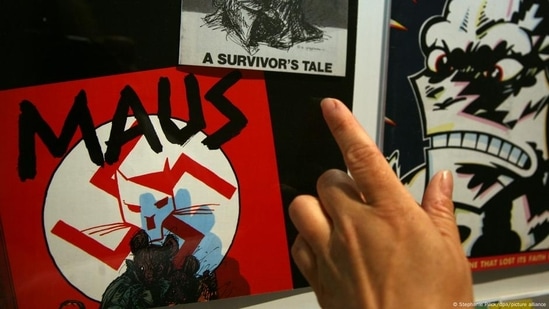
Comic classics that portray the Holocaust
8 months ago | 95 Views
Jewish artists and storytellers in particular have illustrated the evils of the Holocaust in comic books since the 1940s, including in superhero classics from Captain Marvel to Superman.
Many superheroes were created by Jewish cartoonists who soon used their characters to invoke the horrors of the Holocaust and the Nazi regime.
In 1940, a comic titled "How Superman Would End the War" showed Superman saying to Hitler: "I'd like to land a strictly non-Aryan sock on your jaw." According to the Holocaust Center of Pittsburgh, Josef Goebbels, Nazi minister of propaganda, denounced Superman as a Jew soon after.
Superheros take on the Nazis
Captain America was already hitting menacing Hitler-esque Nazi characters in comics from the early 1940s. Such fascist villains also featured in animated books like Dr. Seuss during the war years.
And stories of Jewish resistance in concentration camps emerged as themes in Superman and Captain Marvel after the war.
The Captain Marvel story was the first superhero comic to actually feature the Holocaust, according to Holocast scholar Rafeal Medoff, co-author of "We Spoke Out: Comic Books and the Holocaust."
And it was no coincidence that Marvel comics were often authored and illustrated by Jewish artists, including the prolific writer and illustrator team, Stan Lee and Jack Kirby.
Medoff describes how Captain Marvel's partner Rick Jones meets an Auschwitz survivor before confronting a deranged scientist who is trying to implement Nazi-style social engineering.
The 2018 book "We Spoke Out," also authored by Neal Adams and Craig Yoe, shows how comics helped younger Americans growing up in the 1960s and 1970s better understand a Holocaust they weren't taught about at school — far fewer youth can likely comprehend this history today.
These earlier Holocaust-themed works coincided with what the comics scholar Markus Streb called the "Golden Age of Comic Books" from 1938 to 1955.
Streb notes how German concentration camps found their way into comic books in the 1940s, with the most popular superhero genre hinting at the atrocities committed in the camps.
Then by 1979, the fourth part of a Marvel novel series titled "Captain America: Holocaust for Hire," updated the Hitler narrative to describe how the superhero had to stop an army of neo-Nazis using a new destructive weapon to establish a Fourth Reich.
ALSO READ: HT Editorial| Why we must never forget the Holocaust
'Master Race' explores the fear of a Holocaust survivor
The comic Golden Age was capped by the 1955 classic "Master Race," regarded as the first US comic to depict Nazi atrocities — and featuring a swastika on the front cover.
Released by US publisher EC, "Master Race" was written by Al Feldstein and illustrated by Bernard Krigstein and tells the story of Carl Weismann, a German who escaped the Belsen concentration camp and moved the US but could not escape his nightmarish past.
"You'll always be afraid, you'll keep remembering … keep remembering the horror … the hate … the suffering," states the narrator as Weismann sits on a train and soon faces his death camp nemesis.
Auschwitz is name checked in the first volume of the Captain Marvel series from the 1960s, when the titular character is saved by a Jacob Weiss, a survivor of the notorious Auschwitz camp in Poland who sacrificed his life for Marvel's partner.
The X-Men comic from the 1980s also revealed how the villain Magneto was an Auschwitz survivor.
'Maus' brings Holocaust to the masses
Art Spiegelman's "Maus" is a Pulitzer Prize-winning graphic novel and thinly-veiled metaphor for the Holocaust as it depicts Jews as anthropomorphic mice, the Nazis as blood-thirsty cats and Poles at pigs.
Inspired by the author's Polish Jewish parents who survived the Nazi concentration camps, his comics were published in installments in the 1970s and 80s and finally as a graphic novel in 1991.
"Maus" is based on hours of interviews the artist recorded with his father, Vladek, in the 1970s — his mother committed suicide in 1968.
But Spiegelman was severely criticized for his choice of symbolism — and for presenting the story as a graphic novel. Critics said he was breaking taboos, that the complex story of the Holocaust couldn't simply be told in the form of a comic.
Spiegelman replied that he could only deal with this story through his art.
How then does a son, born just three years after the end of the war in Sweden before moving to New York, react to a father's horrific memories, both on a professional and personal level?
For Spiegelman, it was "Maus," which was sometimes published as "Maus: A Survivor's Tale."
Ironically, the book was banned in a Tennessee school district in 2022.
In response, Spiegelman, in an interview with MSNBC, called the ban "an echo of the 1930s book burnings in Germany."
Read Also: European Roma Holocaust Remembrance Day: A personal account




















